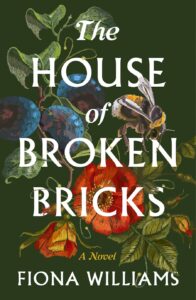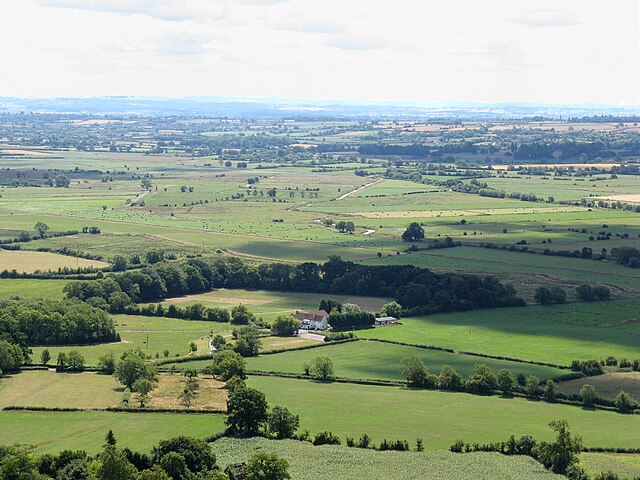
An unusually wild landscape tells an unusually wild year in a marriage (Somerset, England and South London, one year): You don’t need to hook a reader if you write poetically and with meaning.
If you add in unusual structuring in an unusually plotted story of a marriage cycling through the seasons of an unusually tumultuous year for a mother who finds herself in an unusual landscape in the UK’s first “Area of Outstanding Beauty” parenting a rare combination of biracial fraternal twins, prepare to be dazzled.
“It feels weird being called the black one,” says ten-year-old Sonny, the “mini-me” of his mother Jess’s Jamaican roots, whose “hugs are sandalwood and vanilla cardigans.” An “old soul,” a poet-in-prose, and the first voice introduced to us setting the hypnotic, emotionally-torn, and melancholy tone of the bi-racial story in The House of Broken Bricks by Fiona Williams. “What do they mean?” he asks. “We’re more than three generations now, so I belong more than most of the villagers do. But does it count if I only belong on one side of the family?”
“The best part of being twins” is the “magic bridge our thoughts can travel across,” says Max, Sonny’s twin brother, the second voice we meet. He’s white but perceives himself as Black because identity goes far deeper than the color of one’s skin.
Tess’s thirty-four-year-old voice comes next. Born and raised in South London, a “kaleidoscope of ethnicities,” so: “Before moving here, nothing could have prepared me for being the only black person in a completely white environment, for being looked at in such a penetrative way.”
These members of one family minus the white father and husband are introduced in the first three chapters, taking up only thirteen pages. Richard’s voice arrives pages later. A literary technique that enhances his absence, his distance during a torturous year. He’s lived his entire life in the same house in an ancient, rural village around Quantock Hills, surrounded by ecologically significant moorlands and wetlands, teeming with a wide-diversity of wildlife. Making his troubles in the place he calls home, whereas his wife’s are in wildly unfamiliar territory.
Tess and her family depict the Jamaican diaspora that arrived in Britain in the hundreds of thousands after WWII. Often seen cooking the spicy foods of her culture she used to find easily in London, but not when so isolated from it. Food calms her, connecting her to her Black Caribbean identity and family.
Among the novel’s unusual attributes is how racism is turned on its head. Intoxicating to flip the stereotypes: Max, the pale white boy, is the outsider in a white school; Sonny the popular one. Max is attached to his brother’s hip, clings to his mother, and doesn’t jump at the chance to work beside his father helping with his vegetable gardening business. A victim of fickle and inhospitable weather, particularly during the long winter months in a region that tracks sunshine and has a history of flooding.
How right it feels to open the story in the changing season of autumn, signaling the changes a marriage undergoes.
The “painful beauty” of this mystical place – Somerset, England, a place of long-held traditions – is ingrained in the storytelling, in the lives of this family. Williams knows both the area and Tess’s South London home. Originally from the same part of the city, she now lives in the same Somerset Levels Tess does. She too is of Jamaican descent.

By Arpingstone [Public domain] via Wikimedia Commons
None of the chapters are more than five pages long in a 350-page novel. The structure works; doesn’t feel disjointed or jarring. Instead, we feel like we’re inside the broken house observing, hearing, and feeling reactions to events unravelling in real-time. To two sensitive boys acutely tuned into their parents always arguing, a mother always crying. Richard’s disappearances and closing himself up are told in the third-person voice, whereas everyone else in the more intimate first-person. Another effective literary technique.
Sonny’s poetic lines, one by one, grab us beginning with the first line: “Sometimes there are no dreams,” says the dreamer we mostly see. His opening is prophetic. “I’m lost inside the blackness of the moon,” he says a few lines later. But before his one-page chapter ends, he speaks of the meadowsweet and loosestrife plants by the river their home backs up to. How he lets it “carry me as I listen to the music of the stars and the kree, kree, kree of little egrets.”
Gorgeous nature-writing balances the story of a marriage in crisis. We inhale “the soil’s perfume sweetening the air” while forces conspire against this family. Can two parents who want different things survive a marriage?
Williams won an International Creative Writing Prize in 2021 for the novel. It’s not unusual to write what you know, but it is unusual to write as poetically consistent prose as she does.
Tess also mirrors the author’s quest for belonging. See interview. Will Tess ever come around to feeling she belongs in this community? Gossipers and noisy villagers who stare at her, causing her to isolate herself more than she already has. Like her twins are, she was once drawn to the landscape’s beauty Richard took pride in showing her. These days he shows her very little.
Which is why we focus on her needs and desires. There will come a time when we focus on his. His agricultural lifestyle, typical of the county, his needs and desires to save it as well as his marriage.
The boys’ passions also reflect their environment: Sonny collects fossils, symbolic of “two hundred million years ago” when “the moor used to be a sea with plesiosaurs and ichthyosaurs and ammonites.” Later, his interests become even more meaningful, and lend to using another literary technique – magical realism. Max is the bird watcher, collecting feathers. Fitting as 357 species have been recorded in Somerset’s marshes and moors.
You’ll like Richard from the perspective of how selfless he is with his neighbors. “Good to be neighborly,” he says, in the place with England’s largest neighborhood watch program. Otherwise, you’ll want to shake him up to what’s happening to Tess. He’s lost his way, but you’ll discover his heart is in the right place.
Tess stays clear of most of her neighbors and the PTA moms at the school the twins attend, with the exception of one seemingly supportive female friend she’s on the fence about and one comforting neighbor Cyril she trusts. A former actor with a colorful life cut down by an illness he’s succumbing to. He offers valued wisdom, friendship, and generosity to the boys and Tess, aware they’re going through hard times.
British features such as local governance by parish councils make their way into Richard’s plight. So does Somerset’s history of apple growing, cider making, and cider drinking – UK producing the most in the world. His drinking increases as his confidence plunges.
“All I want is for things to go back to the way they were,” says Sonny. Will they?
Lorraine